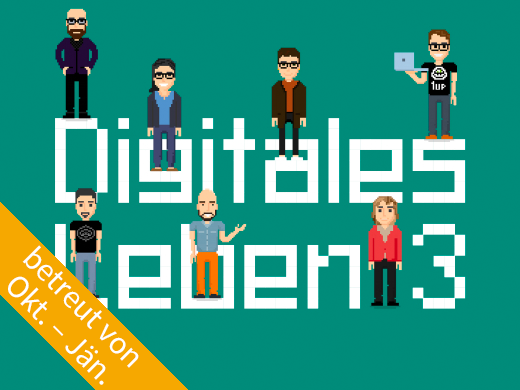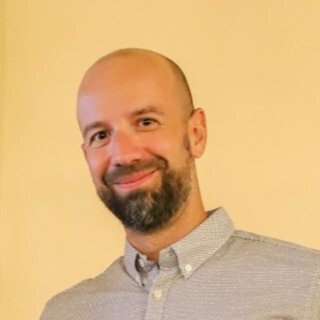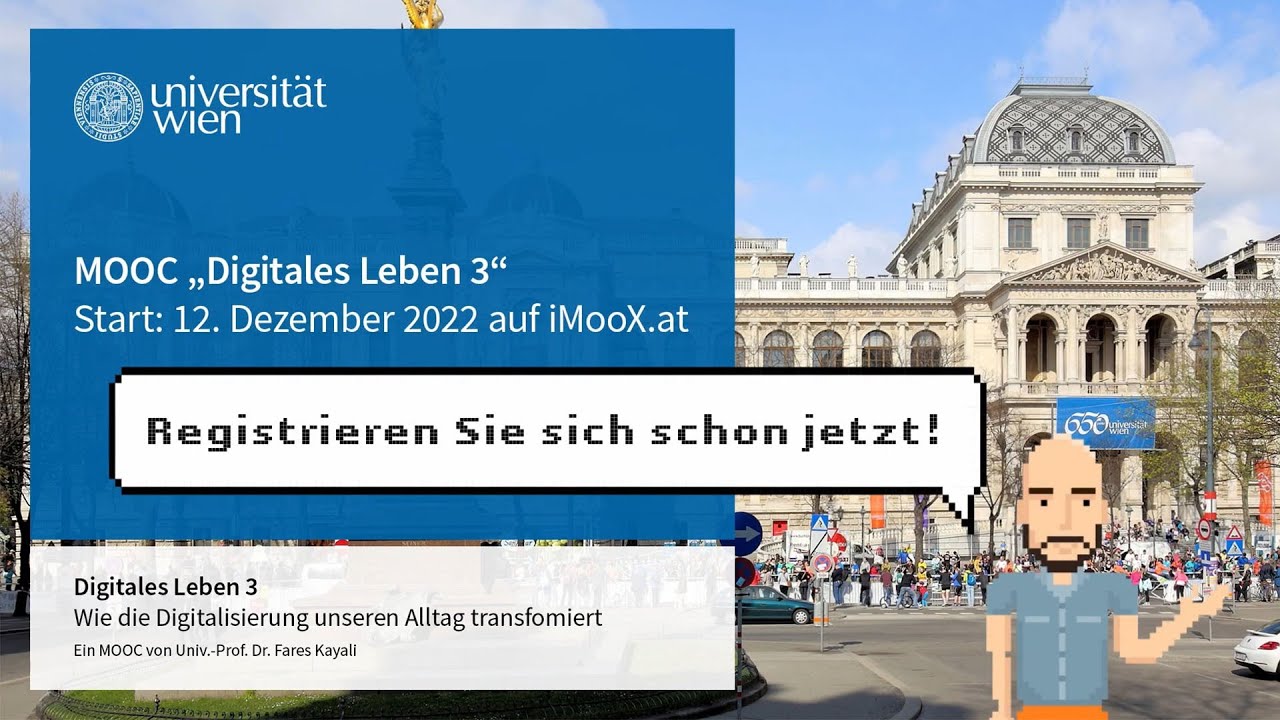


Digital Life 3
University of Vienna
Univ.-Prof. Dr. Fares Kayali
About
Trailer for Digital Life 3
Content
Course Content
Even in today’s digital age, we are still concerned with the same questions that have concerned us for a very long time. These are questions such as: What is a good life supposed to look like? How can we reduce inequality? What part can each of us play in this? In a total of 20 learning videos, the MOOC “Digitales Leben 3” (“Digital Life 3”) deals with how we collectively shape social spaces – offline as well as online –, how we design technologies, and how these two aspects interconnect. In the following 5 course units, 7 lecturers discuss examples of tangible impacts that the digital transformation has or can have on our daily lives from a technical, social, and pedagogical perspective.
The topics of the 5 course units are:
- The significance of participation in the design process for successful human-computer interfaces
- Technologies and their relation to people and society
- Digital games, gamification, serious games: design choices
- Social potential of hacker and maker culture
- Social media: change of the public sphere and growing networks
“Digitales Leben 3”, together with “Digitales Leben 2” and “Digitales Leben”, form a MOOC series on various relevant aspects of the digital revolution and the related transformation processes. The numbers are not meant to indicate an order – as a learner, you can work on any of the “Digitales Leben” MOOCs first. We hope to continue this series in the future!
Course Goals
After completing this MOOC, you will be familiar with key terms in connection with the digital transformation, the application of technologies, and shaping or actively participating, respectively. You will develop your own points of view based on the speakers’ selected key points. The lectures will enable you to assess the risks and potentials of digital transformation processes, take a constructive and critical stance on digital change, and see yourself as an active part of the digital revolution.
Previous Knowledge
We welcome participants’ initiative as well as their independent and interest-driven acquisition of knowledge. The course language is German. English language skills are required for some of the written sources (though reading them is optional). The videos in course unit 5 are in English but have German subtitles and transcripts.
Course Procedure
The MOOC consists of an introduction, and 5 course units comprising 4 learning videos each. Once you are actively enrolled in the MOOC, all units are available to you and you can work through them in any order you choose. Additional information and interactive elements such as reflection questions and prompts accompany the videos. To develop your own positions, we encourage you to use the forum – we will guide you with discussion prompts for each of the course units. For self-assessment (and for the iMooX certificate), there is a quiz with five questions per unit.
Titles and lecturers of each course unit
- Introduction: overview and explanations (Unit 1)
Univ.-Prof. Dr. Fares Kayali - Human-centered design and participation for successful human-computer interaction (Unit 2)
Univ.-Prof. Dr. Renate Motschnig - Designing digital futures (Unit 3)
Univ.-Prof. Christopher Frauenberger, PhD - Digital games – more than entertainment (Unit 4)
Mag. Daniel Handle-Pfeiffer, Prof. Dr. Fares Kayali, DI Matthias Steinböck - Learning from hackers: taking control of digital developments (Unit 5)
Univ.-Prof. Sarah R. Davies, PhD - Digital networks and the public (Unit 6)
Univ.-Prof. Dr. Annie Waldherr
Certificate
Upon course completion, an automated certificate of participation will be provided, stating your username, the course name, the course duration, and the amount of work involved. We would like to point out that this certificate will simply confirm that you have correctly answered at least 75 % of the self-assessment questions.
Licence
This work is licensed under CC BY-SA 4.0Kursübersicht
- Lektion 1: Einführung
- Einführung zum MOOC „Digitales Leben 3“
- Spielerisches Element: Significant Terms
- Begriffspuzzle
- Lektion 2: Human-Centered Design und Partizipation für gelungene Mensch-Computer-Interaktion
- Wo und wie interagieren Menschen mit Computern? – Ziele und Orientierung
- Human-Centered Design erfordert Participation und Empathie
- Qualitätsmerkmale und Evaluierung von Mensch-Computer-Schnittstellen
- Die steigende Bedeutung von Mensch-Computer-Interaktion im digitalen Leben
- Lektion 3: Digitale Zukünfte gestalten
- Einführung – Houston, we have a problem
- Relationale Perspektiven – Das Digitale, mehr als ein Werkzeug
- Die Politik digitaler Technologien
- Teilhabe und Gestaltung
- Lektion 4: Digitale Spiele – mehr als Entertainment
- Mit Gamification kleine Spielräume gestalten
- Spielt Ernst Serious Games?
- Spiele als Möglichkeitsräume
- Podcast: Was können wir aus Spielen lernen?
- Lektion 5: Von Hacker:innen lernen: Die Kontrolle über digitale Entwicklungen übernehmen
- Was ist ein:e Hacker:in?
- Was tun Hacker:innen?
- Critical Making: Die Politik von Hacking
- Was uns Hacking und Making über digitale Transformationen lehren
- Lektion 6: Digitale Netzwerke und Öffentlichkeit
- Soziale Medien
- Öffentlichkeit
- Kontext-Kollaps
- Netzwerköffentlichkeiten
- Abschluss
Copyright
The course image of the MOOC “Digital Life 3” was created by the CTL University of Vienna and is licensed under CC BY-SA 4.0 (https://creativecommons.org/licenses/by-sa/4.0/legalcode).
The trailer of the MOOC “Digital Life 3” was created by the CTL University of Vienna and is licensed under CC BY-SA 4.0 (https://creativecommons.org/licenses/by-sa/4.0/legalcode).
Note: The references must be retained if the licensed material is reproduced and/or distributed in whole or in part, or if modified material is created, reproduced, and/or distributed.
Course Instructor

Univ.-Prof. Dr. Fares Kayali
Prof. Kayali has many years of experience in the interdisciplinary field of computer science, society, and didactics. Among other things, his Digital Education and Learning Group at the Centre for Teacher Education, University of Vienna, runs the Computational Empowerment Lab. His research interests include user-centered design, critical aspects of the digital transformation, and digital as well as serious games. The MOOC series “Digitales Leben” (“Digital Life”) is part of his lecture “Digitale Transformationen” at the University of Vienna.
Lecturers
Univ.-Prof. Sarah R. Davies, PhD
Technosciences, Materiality and Digital Cultures
University of Vienna
Univ.-Prof. Christopher Frauenberger, PhD
Human-Computer Interaction
University of Salzburg
Mag. Daniel Handle-Pfeiffer
Center for Teaching and Learning
University of Vienna
Univ.-Prof. Dr. Fares Kayali
Digital Education and Learning Group
University of Vienna
Univ.-Prof. Dr. Renate Motschnig
CSLEARN – Educational Technologies
University of Vienna
DI Matthias Steinböck
Digital Education and Learning Group
University of Vienna
Univ.-Prof. Dr. Annie Waldherr
Computational Communication Science
University of Vienna
Login & Enrol Currently: 804 Participants
Free for all € 0.00
Partners

University of Vienna
Wien
